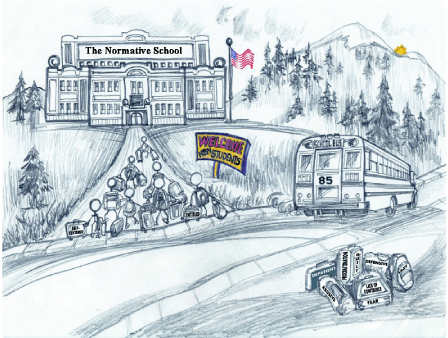You are charged with the responsibility of educating children . . . preparing them to become the future leaders of tomorrow. Sometimes, depending on the culture of your school, this is difficult to do. Behavioral issues interfere with the educational process. Without classroom discipline and accountability, learning will not take place. Instead, social promotions will be the norm and students will not be prepared for life. The missing link for getting control of the school environment is in managing normative behavior.
Professional Development Series
The Normative School District
 The Normative Leadership model is a "how to" operating system for changing and managing the informal, or normative culture, within an organization. Each of the schools within your district have a unique organizational culture which is a direct reflection of the principal’s ability to lead. Some schools are better than others. So the question is: How do you improve the performance of the schools that are struggling without penalizing those that are doing well?
The Normative Leadership model is a "how to" operating system for changing and managing the informal, or normative culture, within an organization. Each of the schools within your district have a unique organizational culture which is a direct reflection of the principal’s ability to lead. Some schools are better than others. So the question is: How do you improve the performance of the schools that are struggling without penalizing those that are doing well?
The Normative Leadership system will put everyone on the same page, enabling you to have a more consistent system for the way your principals manage their schools. Now problems, such as poor academic performance, personnel issues, inappropriate student behaviors, bullying, peer pressure issues and poor performance of athletic teams, can be addressed in a more conscious, strategic and effective manner district-wide. The following pilot program is a recommended first step in this process:
Normative Leadership Pilot Program:
This two-day program provides an introduction to the Normative Leadership model without making a long-term commitment to the program. A cross-section of up to 30 key school district personnel from across the district will participate in the Introduction to Normative Cultures module. The objectives for this session include:
- To gain a basic understanding of normative behavior and how it shapes the school culture.
- To identify norms that make up the culture within your school(s).
- To measure the culture via your customized Organizational Climate Assessor.
- To learn the simple, but powerful, Normative Leadership skills to change and manage the organizational culture(s) within your school(s).
- To discuss the application of the Normative Leadership model for additional training programs within the district to meet specific needs.
At the completion of the training, participant feedback can be evaluated by the school board and superintendent. Then, a decision can be made regarding the necessary financial and programmatic commitment for continuing with the program. The following is a list of professional development modules that are available within the Normative Leadership model for school districts. The module length and content can be customized to meet your budgetary and time parameters.
School Board and Superintendent Retreat:
This weekend retreat introduces the Normative Leadership philosophy and skills to the leadership group within the school district. Team building, skills development and strategy sessions will be conducted to develop a normative implementation plan within the district.
Normative Leadership Pilot Program: This two-day program provides an introduction to the Normative Leadership model without making a long-term commitment to the program. A crosssection of up to 30 key school district personnel from across the district will participate in the Introduction to Normative Cultures module. The objectives for this session include:
- To gain a basic understanding of normative behavior and how it shapes the school culture.
- To identify norms that make up the culture within your school(s).
- To measure the culture via your customized Organizational Climate Assessor.
- To learn the simple, but powerful, Normative Leadership skills to change and manage the organizational culture(s) within your school(s).
- To discuss the application of the Normative Leadership model for additional training programs within the district to meet specific needs.
At the completion of the training, participant feedback can be evaluated by the school board and superintendent. Then, a decision can be made regarding the necessary financial and programmatic commitment for continuing with the program. The following is a list of professional development modules that are available within the Normative Leadership model for school districts. The module length and content can be customized to meet your budgetary and time parameters.
School Board and Superintendent Retreat: This weekend retreat introduces the Normative Leadership philosophy and skills to the leadership group within the school district. Team building, skills development and strategy sessions will be conducted to develop a normative implementation plan within the district.
Superintendent and Principals: This team building session builds upon the pilot program and enables the district’s leadership team to take an introspective look at their schools and apply the normative concepts in developing an overall plan of action for implementing the normative management system within the district.
Normative Leadership Skills for Leaders: This program is for both formal and informal leaders within each of the schools. Participants will learn how to be more effective leaders when working with both group and individual behavior.
The Normative Educator/"Teacher Survivor Skills": This program provides teachers with a working knowledge of the Normative Leadership skills to create a behavior management system for use in addressingbullying and other inappropriate classroom behavior, and, at the same time, build a strong, positive classroom culture where learning can take place. Teachers will learn simple skills for working with both group and individual behavior.
![]()
The Normative Athletic Department: This program will provide your athletic director, coaches, and student athletes with the "how to" knowledge and skills for creating and sustaining a positive, team-oriented culture within the athletic department and on each of the teams. Consistency in this area will not only improve athletic performance, but also have a positive residual effect on behavior within the classrooms and the overall school.
Athletic Directors: See Programs for Athletic Teams
Coaches: See Programs for Athletic Teams.
Normative Leadership Skills for Students: Learning the Normative Leadership skills will enable students to be more confident and effective as peer leaders and in challenging issues related to bullying.
Parents and School Support Personnel: This program provides an orientation to the Normative Leadership model for parents (PTA/PTO), bus drivers, school law enforcement officers, etc., in order to gain their support for modeling and reinforcing the normative concepts when executing their school-related responsibilities.
The Normative Educator Book
 Every school has a culture. The culture is that informal code of behavior that dictates “how things really happen” around here versus “what should happen.” It is this informal, or normative culture that ultimately defines how effective administrators and faculty will be in addressing bullying and other student-related issues. As a teacher, some issues are systemic in nature and beyond your span of control. However, what you can control is what happens in YOUR CLASSROOM.
Every school has a culture. The culture is that informal code of behavior that dictates “how things really happen” around here versus “what should happen.” It is this informal, or normative culture that ultimately defines how effective administrators and faculty will be in addressing bullying and other student-related issues. As a teacher, some issues are systemic in nature and beyond your span of control. However, what you can control is what happens in YOUR CLASSROOM.
Traditionally, teachers are trained to teach and not deal with behavior. However, how can you teach and how can learning take place if student behaviors are out of control?
The NORMATIVE Educator is a powerful resource for managing behavior in the classroom. It offers a leadership operating system for creating and managing the culture within your classroom , powerful “people skills” for working with both group and individual behavior and a philosophy to guide the use of the skills. The Normative Educator is a simple, but powerful, “HOW TO” book that will give you an intangible edge in being more effective in facilitating a culture of structure, discipline and learning within your classroom enabling your students to be better prepared, BEHAVIORALLY and ACADEMICALLY, for their journey through life.
Contact Rod Hess for more information.




